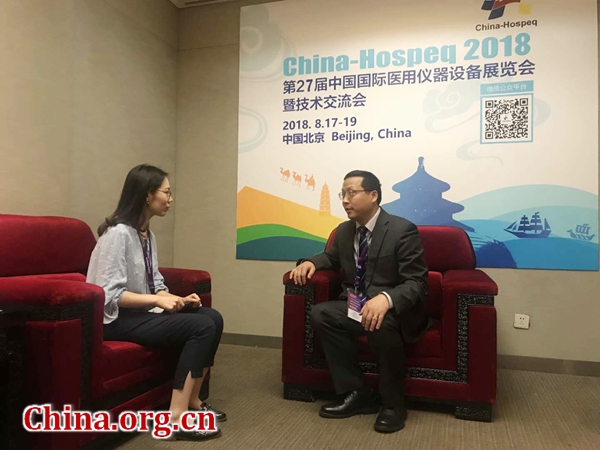Standardization essential to ICT and health convergence
- By Zhang Liying
 0 Comment(s)
0 Comment(s) Print
Print E-mail China.org.cn, August 19, 2018
E-mail China.org.cn, August 19, 2018

Standardization is essential to the convergence of the health industry and information and communication technology (ICT), said Luo Zhong, chairman of the International Telecommunication Union (ITU)-T Study Group (SG) 16 in an exclusive interview with China.org.cn on Friday.
Luo was invited to the Belt and Road Internet Plus Health Conference, a subsidiary meeting of the China Hospeq 2018 held in Beijing from August 17 to 19.
Luo said he is convinced that the convergence of ICT and medicine, one of the oldest professions in human history, will create a new future for the medical and health industry.
He said ICT is a fundamental enabling technology which aims to improve global health development by providing broader, easier, and faster access to health and medical services.
The latest technologies, including artificial intelligence, machine learning, expert system, neural network, and big data analysis, are able to unlock the medical expertise, experiences and raw data accumulated throughout the entire history of medical development, said Luo.
However, according to Luo's keynote presentation on the ICT and health convergence for better human sustainable development at the opening of the conference, a major challenge to advancing the convergence is lack of uniform standards on compatibility and interoperability between different digital medical systems as well as the quality of smart equipment products and health management services.
At a meeting in Ljubljana last month, the ITU-T SG 16 established the ITU-T Focus Group on Artificial Intelligence for Health (AI 4H).
AI 4H will work in partnership with the World Health Organization (WHO) to develop an international "AI for health" standards and assessment framework, and will identify AI cases in the health sector which can be scaled-up for global use.
According to Luo, the focus group, which will operate for a life-cycle of two years starting this September, is a very effective way for all interested parties to quickly come on board without having to join the ITU due to its open-door nature.
A focus group was adopted to boost the broadest possible participation by ITU-T in support of the "AI for Good" strategic vision of the ITU and the UN, Luo said.
He said the demand for such a platform was first identified by the ITU and WHO senior management at the second AI for Good Global Summit held in Geneva from May 15 to 17 this year.
Luo also said that China is playing an increasingly active role in the international standardization work.
Through the cooperation with the ITU and other international standardization organizations, more and more excellent Chinese technical innovations are being introduced to the rest of the world, he said.
Luo described China's ICT development in the past three decades as "magical" and "phenomenal."
He said under the guidance of China's policies to promote the integration of ICT with traditional industries such as the Internet Plus action plan, China's ICT development is accelerating on a fast track and more successful outcomes are expected.
The ITU-T SG 16 is ITU-T's leading study group on multimedia and e-services, which enjoys a friendly cooperation with the WHO and a long history of working on e-health related standards in collaboration with other important standards organizations in the health and medicine domain.





